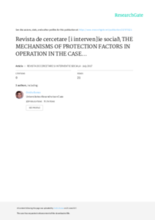Abstract
The article presents the results of a study (n = 119) carried out in April 2016 in the largest placement centre in the county of Iași. The aim of the research was to identify the processes that support the good results obtained by the teenagers and young persons who reside here, given that they are subject to numerous risk factors that originate in their past but are still in operation today, but also to their concerns regarding the future. Another objective has been to identify the most effective intervention models for the clients of such institutions in the given circumstances. The research was designed based on an ecological model of resilience which suggests that the good results obtained by the members of a group facing adversity are associated with the individual resources they can rely on. The instrument we used was a questionnaire focussing on 14 items concerning risks, 56 items concerning resources individual traits: self-efficiency and autonomy, the internal locus of control, planning ability, optimism and hope, sociability; social resources: peer group, school, placement centre; belief and values) as well as 16 outcomes (status and welfare), the results being analysed statistically. The questionnaires were distributed to the 132 young persons in the target group; the responses came from 119 clients (90%) aged between 14 and 24 (average = 16.95, SD = 1.87). The research results have led us to the conclusion that the protective mechanisms – which act directly upon the risks – are underpinned mainly by the young persons’ individual traits, whereas the compensatory mechanisms – which act directly upon the outcomes – are underpinned mainly by the same traits, but also by the support the teenagers receive in the placement centre.

